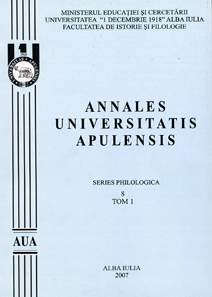IMAGINAŢIA SIMBOLICĂ ÎN OPERA LUI MIRCEA ELIADE
THE SYMBOLICAL IMAGINARY IN MIRCEA ELIADE'S LITERARY WORK
Author(s): VIOREL STEFANEANUSubject(s): Literary Texts
Published by: Universitatea »1 Decembrie 1918« Alba Iulia
Keywords: Gilbert Durand; Mircea Eliade; anthropological model; objective truth
Summary/Abstract: The work of Mircea Eliade, mainly devoted to ancient societies and disappeared civilizations, is also situated in the context of contemporary anthropological research (Gilbert Durant, Fromaget Michel, Georges Gusdorf, Gregory Bateson, etc..) insofar as it challenges the predominant anthropological model in our modern societies, based on rationalist, positivist and materialist assumptions. This is a true "theology of the death of God" - in the words of Mircea Eliade - that is, ultimately, nothing but the negation of the spiritual dimension that defines the human species and distinguishes it from other creatures of the earth. Concepts such as "laws of nature", "historical necessity" or "objective truth" are really just modern myths that by denying the value of the mind and the human subject, have generated "a psychology without a soul "(CG Jung), an anthropology without the Man, an ontology of Being and a metaphysics of nothingness (as defined by Sartre in his voluminous book 'Being and Nothingness or by Albert Camus in his famous essay "The Myth of Sisyphus"). Highlighting the crucial importance of the symbolic imagination, both in traditional societies in the modern world, since this both intellectual and emotional ability can restore the unity between the outer biological and socio-historical man outside, and the inner, psychological and spiritual one, in other words between the inside world and the outside world, the work of Mircea Eliade opens a new science of man and constitutes a major and always topical reference for many social scientists and interdisciplinary research.
Journal: Annales Universitatis Apulensis. Series Philologica
- Issue Year: 8/2007
- Issue No: 1
- Page Range: 157-161
- Page Count: 5
- Language: Romanian

